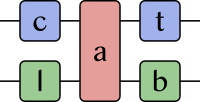Computational Categorical Algebra with Catlab
Abstract
A vast swath of computation and computer science theory takes place on combinatorial data structures, which are often presented as variations on the theme of graphs. Catlab.jl is a Julia package for computational category theory, which includes an implementation of C-Sets, also known as copresheafs or category actions. C-Sets always form an adhesive category and can be used for general rewriting systems. This talk will present the theory and implementation of C-Sets along with some examples. In particular, Colored Graphs and String Diagrams (syntax for symmetric monoidal categories) will be shown.
Date
Friday, May 7, 2021 15:00 Europe/Paris
Event
GReTA seminar
Further information:
- AlgebraicJulia homepage: https://www.algebraicjulia.org
- AlgebraicJulia blog: https://www.algebraicjulia.org/blog

Some references discussed during the Q&A session after the talk:
- mentioned by A. Corradini: J.W. Gray, The category of sketches as a model for algebraic semantics, Contemp. Math. 92 (1989) 109-135.
- mentioned by R. Heckel: Corradini A., Groβe-Rhode M., Heckel R. (1999) An Algebra of Graph Derivations Using Finite (co—) Limit Double Theories, Springer LNCS, vol 1589. https://doi.org/10.1007/3-540-48483-3_7